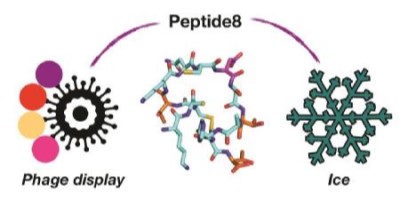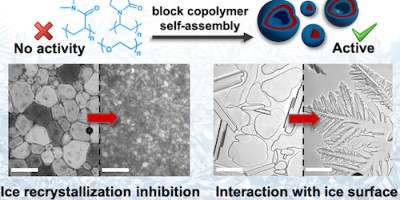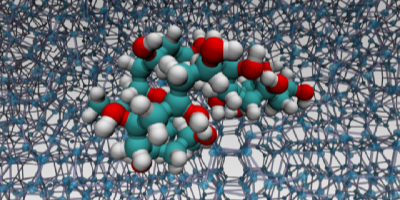Departmental news
Discovery of minimalistic cyclic ice binding peptides

The Gibson and Sosso groups have collaborated with partners in Switzerland to use phage display to discover small antifreeze peptides. Read more
Polymer Nanoparticles to Control Ice Growth

The GibsonGroup, in collaboration with Dr Tom Whale, have published in the Journal of the American Chemical Society, showing that polymer nanoparticles can inhibit ice growth. Read more...
Funding granted for cleaner, greener chemicals

Researchers at the Universities of Warwick and Nottingham have received EPSRC funding to launch a ground-breaking research programme for global specialist chemical manufacturer, Lubrizol.
Solving the puzzle of polymer-ice binding for cryopreservation

When biological material is frozen, cryoprotectants are used to prevent ice damage. How do newly emerging polymeric cryoprotectants control ice formation and growth during freezing?
Prof. Matthew Gibson awarded 2021 McBain Medal from the RSC and SOCI
Professor Matthew Gibson has been awarded the 2021 McBain medal from the Society for Chemical Industry and Royal Society of Chemistry. This award is to "honour an early career researcher or technologist who has made a meritorious contribution to colloid and interface science." There were will be a special symposia late in 2021 where Matt will receive the medal and give a lecture.
GibsonGroup's Glycosylated nanoparticles for selective galectin targeting is ‘HOT’ article in Chemical Science
Glycans (aka sugars, carbohydrates) direct many recognition and signalling processes in biology. Multivalency (presentation of lots of copies) is crucial to overcome glycans intrinsic low affinity, hence materials (polymers, particles, surfaces) which display them are appealing probes of function, or as new diagnostics (e.g. see our work on COVID diagnostics). However, most studies use simple monosaccharides, which may not have selectivity or are only tested against plant proteins. In this work, we collaborated with teams from Bristol, York and Southampton - our collaborators developed a chemoenzymatic synthesis to obtainselectively fluorinated glycans based on lacto-N-biose. Fluorine is appealing as it is small, does no have significant effects on conformation, but can change hydrogen bonding patterns. These glycans were incorporated into our polymer-stabilised nanoparticle platform, and found to modulate the affinity towards 2 galectins -an important class of galactose-binding biomarkers. This work shows that unnatural glycan-functional nanoparticles could be deployed as biosensors.
